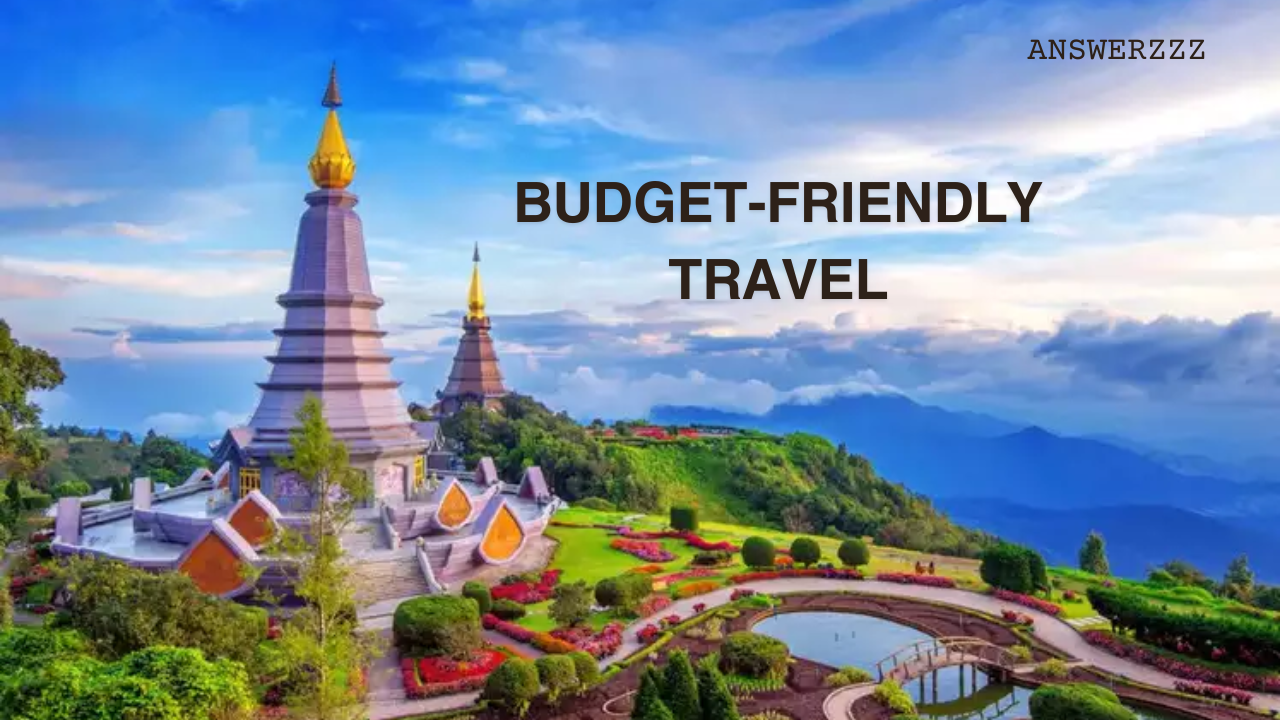Travelling the world doesn’t have to be an expensive endeavour. With the right planning and a few savvy strategies, you can explore new destinations, immerse yourself in diverse cultures, and create unforgettable memories—all while sticking to a budget. In this comprehensive guide, we’ll share practical tips and tricks for budget-friendly travel, ensuring you can make the most of your adventures without breaking the bank.
1. Set a Realistic Budget

Before you embark on your journey, it’s essential to set a realistic budget. Start by determining how much you can afford to spend on your trip. Consider all aspects of your travel expenses, including:
- Transportation: Flights, trains, buses, or car rentals.
- Accommodation: Hotels, hostels, or vacation rentals.
- Food and Drink: Dining out, groceries, and snacks.
- Activities: Tours, entrance fees, and experiences.
- Miscellaneous: Souvenirs, tips, and unexpected expenses.
Once you have a clear understanding of your budget, you can prioritize your spending and make informed decisions throughout your travels.
2. Choose Budget-Friendly Destinations
Some destinations are inherently more budget-friendly than others. When planning your trip, consider choosing countries or cities known for their affordability. Here are a few budget-friendly destinations to consider:
- Southeast Asia: Countries like Thailand, Vietnam, and Indonesia offer stunning landscapes, rich cultures, and low costs for food and accommodation.
- Eastern Europe: Cities like Budapest, Prague, and Krakow are often less expensive than their Western counterparts but still offer incredible history and culture.
- Central America: Countries like Guatemala, Nicaragua, and Costa Rica provide beautiful nature, adventure activities, and affordable living costs.
Research various destinations to find those that fit your budget and offer the experiences you desire.
3. Be Flexible with Travel Dates
Flexibility is key to finding the best travel deals. If your schedule allows, try to be open with your travel dates. Here are some strategies for scoring cheaper flights and accommodation:
- Off-Peak Travel: Traveling during the off-peak season can lead to significant savings. Prices for flights and accommodation often drop outside of school holidays and major events.
- Flexible Flight Search: Use flight comparison websites to search for the cheapest dates around your desired travel period. Many platforms allow you to view prices across a range of dates.
- Last-Minute Deals: Sometimes, booking last minute can yield incredible discounts, especially for accommodation. Apps and websites like HotelTonight specialize in last-minute hotel deals.
4. Use Budget Airlines and Alternative Transportation

When it comes to getting to your destination, consider using budget airlines or alternative forms of transportation to save money:
- Budget Airlines: Airlines such as Ryanair, EasyJet, and Spirit Airlines offer significantly lower fares than traditional carriers. Be mindful of additional fees for baggage and seat selection.
- Trains and Buses: In many regions, trains and buses can be a cost-effective way to travel. Look into local train passes or bus companies for savings on intercity travel.
- Ridesharing and Carpooling: Platforms like BlaBlaCar allow you to share rides with others, making it a budget-friendly option for longer distances.
5. Opt for Budget Accommodation
Accommodation can take up a significant portion of your travel budget, but there are plenty of budget-friendly options available:
- Hostels: Dormitory-style hostels are often the cheapest option for travellers. They provide a chance to meet fellow adventurers while keeping costs low.
- Guesthouses and Homestays: Consider staying in guesthouses or homestays, where you can experience local hospitality and often enjoy home-cooked meals.
- Vacation Rentals: Websites like Airbnb and Vrbo can offer budget-friendly alternatives to hotels, especially for groups or longer stays.
- Camping: If you’re open to it, camping can be a fun and inexpensive way to stay in beautiful natural settings.
6. Eat Like a Local
Food is an essential part of any travel experience, but dining out can quickly add up. To keep your food budget in check, consider these tips:
- Street Food: Embrace the local street food scene. It’s often delicious, authentic, and significantly cheaper than restaurant meals.
- Local Markets: Visit local markets to buy fresh produce, snacks, and meals at a lower cost. This also provides an opportunity to interact with locals.
- Cook Your Meals: If your accommodation has a kitchen, consider preparing some of your meals. This not only saves money but also allows you to try new recipes.
- Lunch Specials: Many restaurants offer lunch specials at lower prices than dinner. Take advantage of these deals to enjoy local cuisine without overspending.
7. Take Advantage of Free and Low-Cost Activities
Exploring a new destination doesn’t have to come with a hefty price tag. Many cities offer a wealth of free or low-cost activities that can enrich your travel experience:
- Free Walking Tours: Many cities provide free walking tours led by local guides. While they’re technically free, it’s customary to tip your guide.
- Museums and Attractions: Research which museums and attractions offer free admission days or discounted rates for students and seniors.
- Nature Activities: Hiking, swimming, and exploring parks are often free or low-cost ways to experience the natural beauty of your destination.
- Local Events: Check local event calendars for free concerts, festivals, and community gatherings during your visit.
8. Use Travel Apps and Websites

In the digital age, numerous apps and websites can help you save money while travelling. Here are some valuable tools to consider:
- Travel Comparison Sites: Websites like Kayak, Skyscanner, and Google Flights allow you to compare prices for flights, accommodation, and rental cars.
- Budget Apps: Use budgeting apps like Mint or You Need a Budget (YNAB) to track your expenses while on the road.
- Travel Forums and Blogs: Platforms like Lonely Planet’s Thorn Tree forum or travel blogs can provide insider tips and advice from experienced travellers.
9. Consider Volunteer or Work Exchanges
For those looking to extend their travels while saving money, consider volunteer or work exchange programs. Websites like Workaway and HelpX connect travellers with hosts who provide food and accommodation in exchange for a few hours of work each day. This not only helps you save money but also offers a chance to immerse yourself in local culture.
10. Keep an Eye on Currency Exchange Rates
When travelling internationally, currency exchange rates can impact your budget. Here are some tips to manage currency exchange wisely:
- Research Rates: Before you travel, research current exchange rates to ensure you get a fair deal when exchanging money.
- Avoid Airport Exchange: Currency exchange booths at airports often charge high fees. Instead, use local ATMs or exchange your money at banks for better rates.
- Use Credit/Debit Cards Wisely: Many credit cards offer favourable exchange rates and no foreign transaction fees. Be sure to notify your bank of your travel plans to avoid any issues.
11. Travel Insurance
While it may seem like an extra expense, travel insurance can save you money in the long run. It protects you from unexpected events such as trip cancellations, medical emergencies, or lost luggage. Research different policies to find one that fits your needs and offers comprehensive coverage without breaking the bank.
Digital Marketing Tips for Small Businesses: A Comprehensive Guide to Growing Your Online Presence
12. Document Your Expenses
Keeping track of your spending while travelling can help you stick to your budget. Consider the following strategies:
- Expense Tracking Apps: Use apps like Expensify or Trail Wallet to document your daily expenses and keep your budget in check.
- Set Daily Limits: Establish a daily spending limit to prevent overspending and ensure you have enough funds for the entire trip.
- Review Regularly: Take a few moments each day to review your expenses and adjust your budget as needed.
13. Embrace the Journey
Budget-friendly travel isn’t just about saving money; it’s about embracing the journey and making the most of your experiences. Here are a few mindset tips to help you enjoy your travels:
- Stay Open-Minded: Sometimes, the best experiences come from unexpected situations. Embrace spontaneity and be open to trying new things.
- Connect with Locals: Engaging with locals can lead to unique experiences, insider tips, and lasting friendships.
- Focus on Experiences, Not Things: Prioritize experiences over material possessions. Memories from your travels will last a lifetime, while souvenirs may fade away.

Travelling on a budget doesn’t mean sacrificing quality or experiences. By setting a realistic budget, being flexible with your travel plans, and embracing local culture, you can explore the world without breaking the bank. Remember to take advantage of free activities, eat like a local, and utilize technology to find the best deals. With careful planning and an adventurous spirit, you’ll create unforgettable memories on your journey, proving that travel truly is possible on a shoestring budget. Happy travels!
Sustainable Living Tips: A Comprehensive Guide to Going Green



